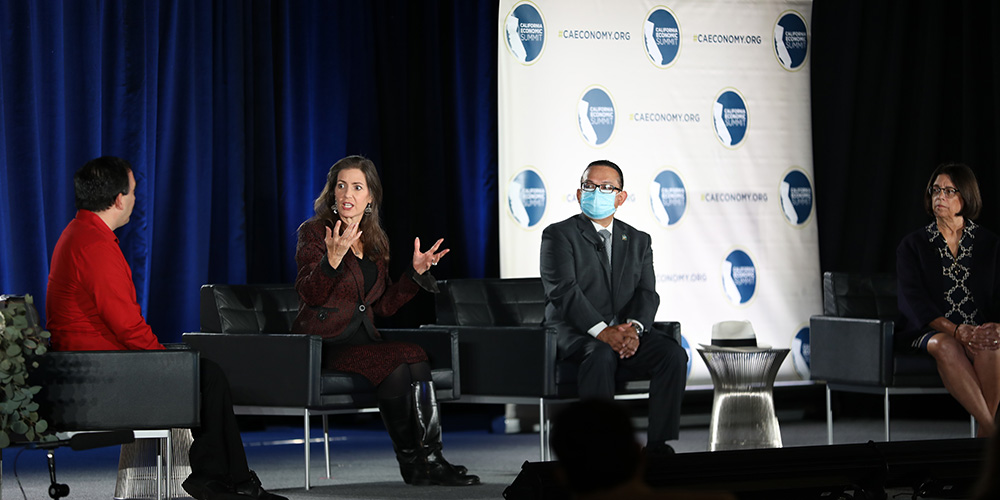
Oakland Mayor Libby Schaaf (middle left) discusses broadband expansion efforts along with Monterey County Supervisor Luis Alejo (middle right), Assemblymember Cecilia Aguiar-Curry (right), and Interim Executive Director of the Office of Community & Economic Development at Fresno State Eduardo González (left). (Photo: Roby Behrens/CA FWD)
The California Economic Summit wrapped up in Monterey today with commitments to assist regional economies across the state, a focus on crucial issues such as broadband and housing and a recognition for two California leaders.
Helping Regional Economies
The historic Community Economic Resilience Fund (CERF), the $600-million, one-time federal American Rescue Plan Act allocation passed earlier this year, is crucial to ensuring that all California’s regions have the ability to recover from the COVID-19 pandemic equitably and sustainably. CA FWD CEO Micah Weinberg led a panel discussion about how CERF will drive local economies, create good jobs and advance the state’s climate goals.
“We truly need to apply an equity lens in the work that we do, especially in the work that directly effects the lives of the people we are trying to help,” said Director of the California Office of Planning and Research Samuel Assefa. He also announced that the public comment regarding the proposed 13 regions that will receive CERF grants has been extended to November 19.
Corporate Commitments to California
A panel of corporate leaders discussed the commitments they are making to California to move the economy forward and mitigate climate change. PG&E’s Jason Glickman emphasized the movement to do things differently, saying, “We’re also reorienting the entire company around the triple-bottom-line.” Driscoll’s CEO Miles Reiter is making a commitment to water management and recycling, two issues that are vital to his industry. Southern California Gas President Maryam Brown said they are investing $2 billion in capital to safety and the reliability of their system, as well as working toward clean energy. JOBY Aviation JoeBen Bevirt said it’s imperative to address the environmental impact of air travel, “We have the technology to build true-zero emissions aircraft. We just need to deploy the resources to make it happen.”
Broadband for All
Providing broadband for all Californians is a priority and became closer to reality with the recent $6 billion investment in broadband infrastructure and two companion bills (SB4 and AB 14). Today, Oakland Mayor Libby Schaaf outlined her broadband priorities after increasing connectivity for all low-income Oakland public school students from 12% to 98% during the COVID-19 pandemic. “Having an open access fiber infrastructure that is serving the most vulnerable communities, be they rural or urban, that is future-proofing. Monterey County Supervisor Luis Alejo added, “The internet is not a luxury for those who just can afford it. It is a necessity for everyday life and should be regulated by the FEC and our state regulators, just as we do for water, electricity or gas.”
Home Ownership and Wealth Creation
Home ownership has traditionally been the way families create intergenerational wealth, but barriers such as redlining and restrictive covenants have kept many families of color from accessing that wealth. And, as California’s demographics change, how does the state reconcile past wrongs? Tara Lynn Gray, director of the California Office of the Small Business Advocate, answered that we need “to invest in communities and neighborhoods where there has been traditional and historical disinvestment. Whether we’re talking about the wealth gap, the earnings gap, the education gap, to even the healthcare gap, we have to intentionally and systematically create policies and programs and, mostly importantly, partnerships that work to close those gaps.”
California and Regional Steward Awards
The California Economic Summit also recognized the work of two leaders vital to the Summit’s success. The 2021 California Steward Leader Award was presented to Assemblymember Cecilia Aguiar-Curry (D-Winters) for her work to provide broadband for all. The Regional Steward of the Year was presented to Kate Roberts, president and CEO of the Monterey Bay Economic Partnership.
California’s next generation of leaders took the Summit stage during a panel featuring the CA FWD Young Leaders Advisory Council. They are tackling issues that range from career pathways to environment sustainability to criminal justice reform. The panel discussed inter-generational collaboration and policy solutions which is not only bringing underrepresented communities to the table, but also engaging with them and including them in the decision-making process. “It’s not enough to provide a seat here. When you provide a seat and we don’t see action, that is what we like to call ‘performative politics,’” said Council member Nicole Crawford.
The final announcement at the 2021 California Economic Summit was that the location of next year’s annual gathering will take place in Bakersfield on October 27 and 28.
Thank you, Monterey for hosting the 2021 Summit. See you in in the Central Valley next year!

